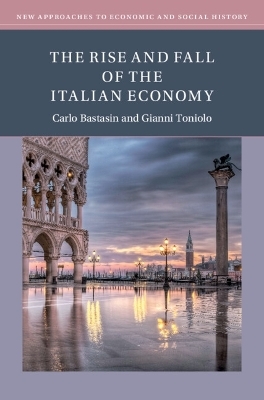
The Rise and Fall of the Italian Economy
Seiten
2023
Cambridge University Press (Verlag)
978-1-009-23534-1 (ISBN)
Cambridge University Press (Verlag)
978-1-009-23534-1 (ISBN)
Carlo Bastasin and Gianni Toniolo provide a much-needed, up-to-date economic history of Italy from unification in 1861 to the present. They reveal the factors behind Italy's twentieth-century growth as well as how economic decline in the last thirty years has resulted in rising levels of populism, mistrust and government instability.
Carlo Bastasin and Gianni Toniolo provide a much-needed, up-to-date economic history of Italy from unification in 1861 to the present day. They show how, thirty years after unification, Italy began a long phase of convergence with more advanced economies so that by the late twentieth century Italy's per capita income reached the levels of Germany, France and the UK. From the mid-1990s, however, the Italian economy declined first in relative and then absolute terms. The authors describe the intertwined financial and institutional crises that eroded trust in the political system and in the economy at the exact juncture when new technologies and markets transformed the global economy. Longstanding problems of uneven levels of education and obsolete bureaucratic and judicial practices deepened the division between economically vibrant regions and the rest, causing polarization, political instability and rising public debt. Italy's contemporary malaise makes the country a test-case for understanding the implications of protracted declines in productivity and the flattening of GDP growth for the stability of western democracies, resulting in populism, mistrust and political instability.
Carlo Bastasin and Gianni Toniolo provide a much-needed, up-to-date economic history of Italy from unification in 1861 to the present day. They show how, thirty years after unification, Italy began a long phase of convergence with more advanced economies so that by the late twentieth century Italy's per capita income reached the levels of Germany, France and the UK. From the mid-1990s, however, the Italian economy declined first in relative and then absolute terms. The authors describe the intertwined financial and institutional crises that eroded trust in the political system and in the economy at the exact juncture when new technologies and markets transformed the global economy. Longstanding problems of uneven levels of education and obsolete bureaucratic and judicial practices deepened the division between economically vibrant regions and the rest, causing polarization, political instability and rising public debt. Italy's contemporary malaise makes the country a test-case for understanding the implications of protracted declines in productivity and the flattening of GDP growth for the stability of western democracies, resulting in populism, mistrust and political instability.
Carlo Bastasin is a Senior Fellow and Professor of European Economic Governance at the LUISS University in Rome and a non-resident Senior Fellow at the Brookings Institution in Washington. Gianni Toniolo was Senior Fellow at LUISS University School of European Political Economy; Professor of Economic and History Emeritus at Duke University; Research fellow at CEPR.
Preface; 1. Italy's parabola, 1861-2022; 2. Political unification and slow growth; 3. Convergence and sorpasso; 4. The trauma of 1992; 5. The lost opportunity, 1996-2007; 6. Sliding toward zero growth; 7. The canary in the coalmine.
| Erscheinungsdatum | 30.08.2023 |
|---|---|
| Reihe/Serie | New Approaches to Economic and Social History |
| Zusatzinfo | Worked examples or Exercises |
| Verlagsort | Cambridge |
| Sprache | englisch |
| Maße | 159 x 236 mm |
| Gewicht | 420 g |
| Themenwelt | Geisteswissenschaften ► Geschichte ► Regional- / Ländergeschichte |
| Geschichte ► Teilgebiete der Geschichte ► Wirtschaftsgeschichte | |
| ISBN-10 | 1-009-23534-6 / 1009235346 |
| ISBN-13 | 978-1-009-23534-1 / 9781009235341 |
| Zustand | Neuware |
| Haben Sie eine Frage zum Produkt? |
Mehr entdecken
aus dem Bereich
aus dem Bereich


